Common Futures
II3UUw
II3UUw
Create successful ePaper yourself
Turn your PDF publications into a flip-book with our unique Google optimized e-Paper software.
<strong>Common</strong> <strong>Futures</strong>: India and Africa in Partnership<br />
country (after Nigeria) to launch a YouthWorks portal called TukoWorks<br />
which is Kenyan slang for “We are at work.” Within the context of the portal<br />
TukoWorks could be described as working with the youth to get them jobs or<br />
working with the youth for them to gain relevant skills and training (at times<br />
to even start their own enterprises).<br />
The TukoWorks online portal provides a one-stop shop for the Kenyan<br />
youth to access free online learning resources, career guidance services and<br />
entrepreneurial resources through a network of accessible tools and content.<br />
In addition to skills and enterprise development resources, one can easily<br />
access information on available job opportunities. In some cases, Microsoft<br />
has partnered with non-governmental organisations to provide additional<br />
offline skills and training for those that cannot access the portal. Thus, the<br />
youth not only have access to jobs through the site but also gain relevant skills<br />
required by employers – bridging the critical gap that exists in Kenya. Recent<br />
data shows that while an increasing number of youth, and even women, are<br />
getting better educated, they often lack crucial employable skills. 5 Ultimately<br />
the skills gap is a major impediment to business in most of Africa and a major<br />
cause of unemployment. However with initiatives such as TukoWorks, the<br />
private sector is finding innovative ways to create a skilled workforce.<br />
Key to enhancing effectiveness of ICT initiatives is the need to ensure access<br />
and equity for groups often locked out of development, especially women and<br />
the socioeconomically disadvantaged. Emerging data shows that women are<br />
disproportionally affected with young women’s unemployment rate standing<br />
at 45% in regions like North Africa. 6 In some cases, it might be possible to<br />
specifically target women such as what Nigeria achieved in the 2013 launched<br />
“SmartWoman Nigeria” 7 , or to ensure women self-help groups participate<br />
for instance in India’s Electronic Service kendrams (eSeva centers). 8 In many<br />
other cases, what is needed are strategic measures to ensure that women are<br />
not barred on the basis of socio-economic issues, and religion. ICTs do have<br />
the transforming power to accelerate the development of women by helping<br />
them to get employed, be more efficient and effective in their jobs, careers,<br />
and businesses or even to generate new employment opportunities.<br />
Key to enhancing<br />
effectiveness of<br />
ICT initiatives is<br />
the need to ensure<br />
access and equity for<br />
groups often locked<br />
out of development,<br />
especially<br />
women and the<br />
socioeconomically<br />
disadvantaged.<br />
Vocational skills training<br />
An interesting trend with implication for employment and available skills set is<br />
the transformation of polytechnics into universities in some African countries.<br />
5 Deon Filmer and Louise Fox, Youth Employment in Sub-Saharan Africa (Washington, DC: World<br />
Bank, 2014).<br />
6 International Labour Organization, World of Work Report 2014: Developing with jobs (Geneva; ILO,<br />
2014).<br />
7 A mobile service based movement by Women in Management Business and Public Service (WIMBIZ)<br />
in partnership with the Nigerian Federal Ministry of Communication Technology. It offers practical<br />
advice for women to help them improve their lives, their business performance, be more efficient and<br />
effective in their jobs; generate new employment opportunities; connect directly with like-minded<br />
women for mentoring and build self-confidence. “Smartwoman,” accessed October 5, 2015, http://<br />
www.smartwomannigeria.org.ng/<br />
8 This was a citizen-to-citizen and citizen-to-government e-governance service provision model that<br />
enabled them access a range of integrated services such as renewal of certificates, licenses and even<br />
payment of utility bills. See Karan, Kavita, and Rohit Raj Mathur. “Women Forge Ahead in India:<br />
Internet and the Public Forum.” The Journal of Community Informatics 6, no. 1(2010).<br />
68








